External wall insulation in Manchester
What is External Wall Insulation (EWI)?
External wall insulation is a fantastic way to insulate your home (Save £££ on your gas bill). External wall insulation involves fixing a layer of insulation material to the wall, then covering it with a reinforcement and a special type of render. The finish can be a textured render, pebble-dash or sometimes a brick slip or a brick effect render finish could be used.
Why should you get EWI?
There are many reasons to get EWI. Some of the main reasons to get EWI are:
- EWI can save approx. £475* per property per year (source: Energy Savings Trust)
- Getting EWI can save approx.1.9 tonnes* of carbon dioxide per year (source: Energy Savings Trust)
- EWI can be applied with minimal disruption to the household and its occupants
- no internal access is required
- EWI does not reduce the floor area (living space) of the property
- Installing EWI improves the appearance of the property – potentially increasing the property’s value
- Installing EWI improves weatherproofing and sound resistance
- Installing EWI can make the building more airtight, reducing drafts and heat loss
- Installing EWI increases the life of the existing property by protecting the existing substrate from the weather
- EWI reduces condensation on internal walls and can help prevent damp (but will not solve rising or penetration damp)
Why Should I get EWI in Manchester?
About 50% of all heat loss from UK homes takes place through external walls. Most homes built before 1920 are made up of ‘solid walls’. By ‘solid walls’, we mean that there is no cavity inside them that can be filled with an insulating material by injecting foam or beads into the wall. In Manchester, most of the houses are pre-1920s meaning that they are only made up of solid walls. This means on average most Mancunians are wasting £475 per year.
EWI is installed in different stages:
Wall Preparation
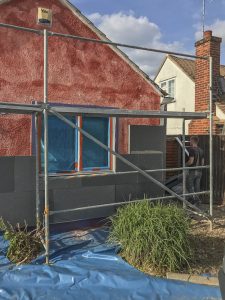
The preparation required depends on the substrate the EWI is going on to. In most cases, a simple rub-down will do, although sometimes we may need to hack-off your existing wall coating. If you are applying EWI to smooth surfaces a universal primer will be needed to allow for the adhesive to stick to the walls. If the wall isn’t completely straight Levelling Mortars must be used to dub the wall. Fungicidal wash should be used to remove any plant life or fungus on the wall.
Addition of Beading and Verge trims
Before the addition of basecoat all beading must be applied. Each beading has it’s own special function and application area:
Corner Beads: Corners beads have mesh and sink into the basecoat. Corner beads reinforce the external corners of the EWI render system
Movement Beads: The movement bead is used inside corners in thermal insulation systems to create a permanent and weatherproof sealant of vertical movement joints.
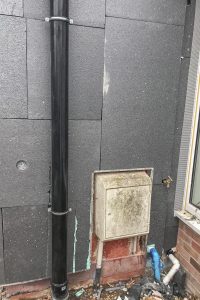
Bellcast Beads: The Bellcast beads are designed to provide a clean, natural stop to the render just above the damp proof course. The bellcast bead also drives water away from the wall.
Render Movement Beads: The Render movement bead should be used where there is a large expanse of render area. The render movement bead is used vertically and is designed to prevent cracking within the render through thermal expansion and compression.
Addition of starter tracks to wall.
The correct starter tracks should be applied to the walls above the DPC. The starter tracks not only allow for the easy installation of Insulation to walls but protects the bottom surface of the insulation against weather, damp and other damage. Clip on profile should be attached to aluminum starter tracks
Applying Insulation to walls
At EWI store our basecoat can be used as an adhesive. The basecoat should be applied to the insulation using our modified dot and dab method (Basecoat applied evenly on the perimeter and 3 dots in the middle). A notched trowel should be used to evenly spread the basecoat on the insulation. The basecoat should be about 4-5cm thick. When placed on the wall mechanical fixings should be used to add some additional security to the insulation (6 fixings should be used per sqm of insulation). Wait 2-3 days to allow basecoat to set.
Basecoat and mesh layer
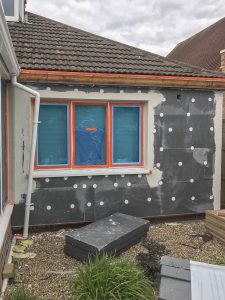
The basecoat should be applied with a notched trowel to the top of the EPS insulation boards – this layer needs to be between 5mm – 6mm. The mesh is then placed on to the basecoat in vertical strips and embedded into the adhesive using the flat edge of the notched trowel. Each vertical strip of fiberglass mesh should overlap its neighboring vertical strip by approximately 10-15cm.
Our platinum grey expanded polystyrene EPS insulation board is a premium product to use for the application of EWI to your external walls. Our EPS insulation board is great as it is:
- Insulating material that will last a lifetime
- Easy to work with
- Lightweight but durable
- Dense material – low thermal conductivity
- Bonded to the substrate by adhesion and mechanical fixings
- Low moisture absorption

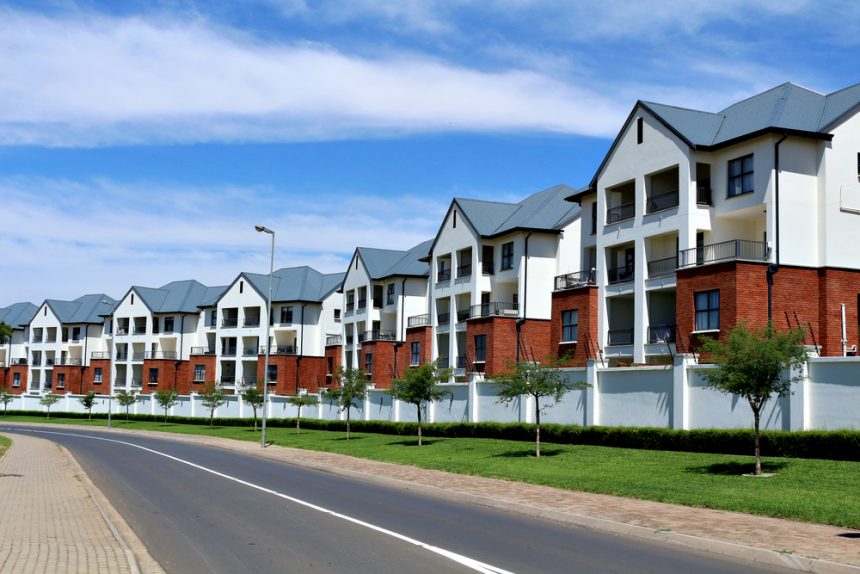

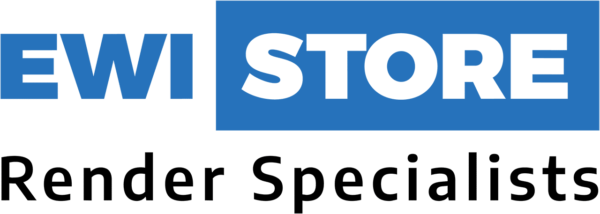











1 comment
Best external wall insulation blog